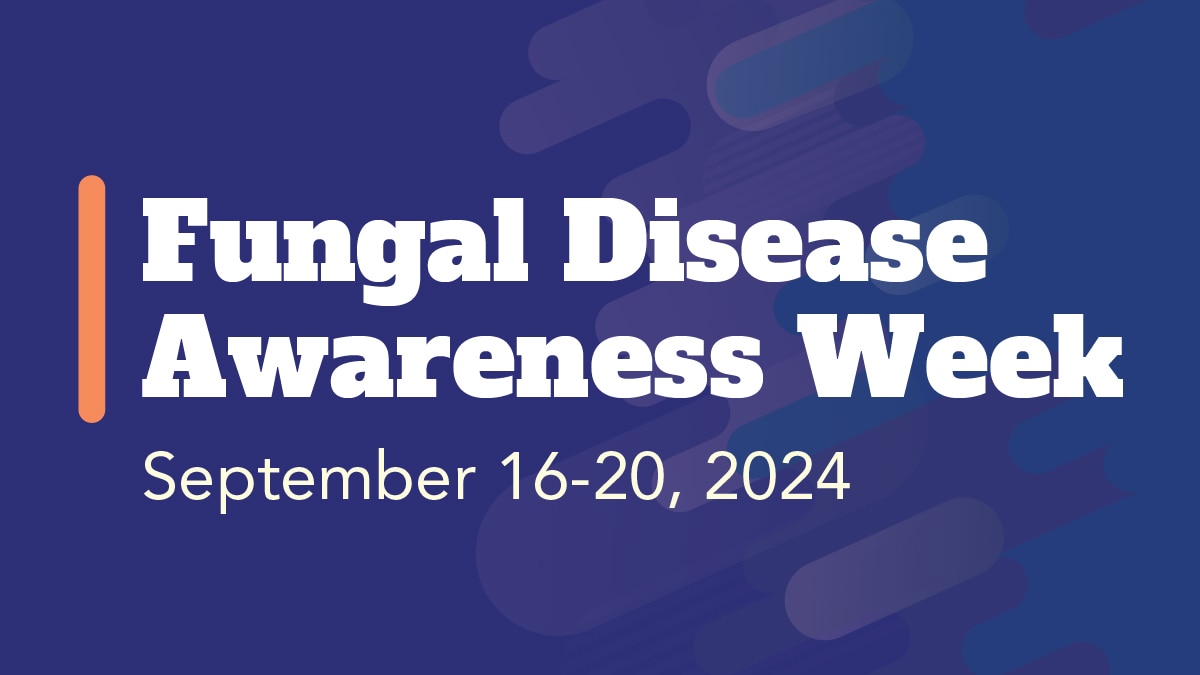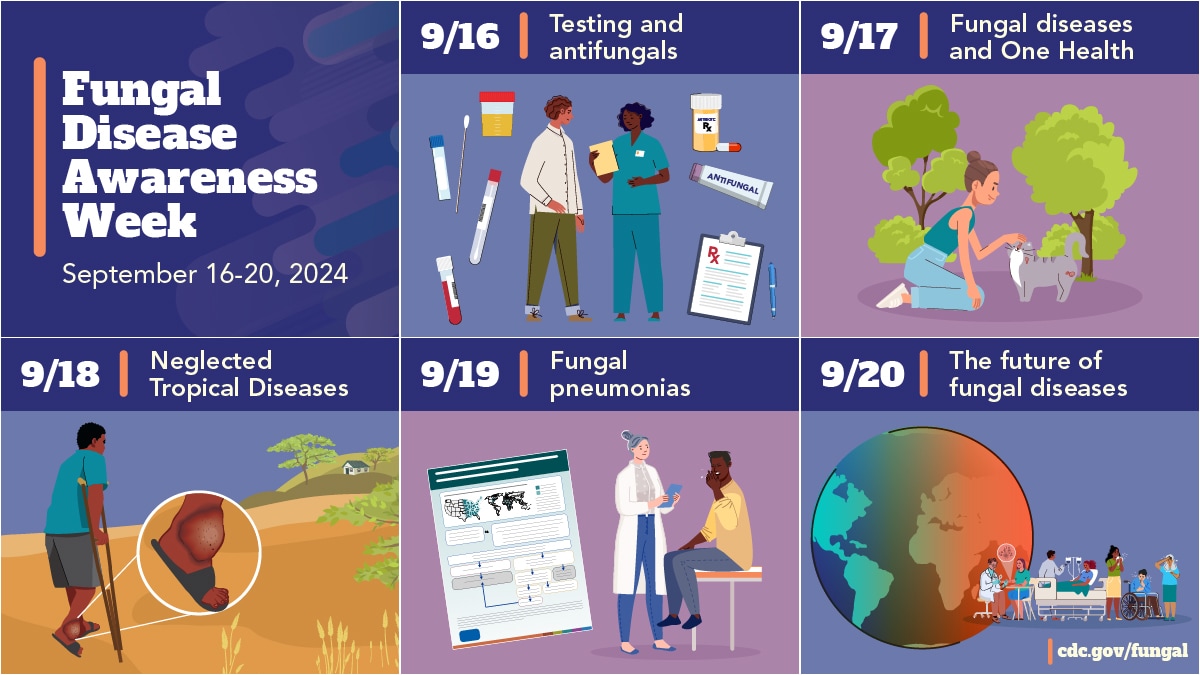At a glance
Fungal Disease Awareness Week (FDAW) is September 16-20, 2024. Fungal diseases are increasing worldwide with antimicrobial resistance on the rise and emerging fungal species causing more severe infections. There are no vaccines for fungal disease prevention, misdiagnosis is common, and there are only three classes of antifungal medications for treatment. Join CDC and partners around the world for #FungalWeek24 to help raise awareness and save lives!

Overview of FDAW 2024

Ways to participate
- Use CDC's FDAW 2024 social media toolkit
- Or choose from other communication materials
- Post with #FungalWeek24
- Or choose from other communication materials
- Join webinars all week.
- Sign up for the Fungal Diseases Newsletter and invite others.
During #FungalWeek24, follow along with the daily taglines and topics, hear from experts around the world, and help raise awareness.
Learn more about the importance of raising awareness.
Daily taglines and topics
Each day of the week has a tagline corresponding to an important fungal disease topic. Social media, featured resources, and webinars will be about the tagline and topic area for the day.
FDAW 2024 taglines and corresponding topics are:
9/16- Think Fungus: Diagnostic tests keep antifungals working their best.
9/17- Fungi are everywhere: On animals and in the environment and air.
9/18- Neglected Tropical Diseases: Fungal infections and unmet needs
9/19- Lung infection won't go away? Learn about fungal infections today.
9/20- The future of fungal diseases: Rising heat makes fungi harder to beat
Webinars
Join CDC and partners for webinars each day on that day's theme. Learn about fungal diseases from international experts, clinicians, patients, veterinarians, and state and local health departments.
Find information and registration for webinars below by clicking on the + beside the title.
Check back for more information and registration information.
Hosted by CDC and the American Veterinarian Medical Association (AVMA)
Save the date!
Please check back here on September 17th for the link to view this webinar.
Presenters:
Dr. Jane Sykes, BVSc, PhD - Professor of Small Animal Medicine at the UC Davis School of Veterinary Medicine
Dr. Clarissa Pimentel de Souza, DVM, MS, PhD - Assistant Professor, Veterinary Clinical Medicine, University of Illinois Urbana-Champaign
Summary: Veterinary experts will discuss emerging fungal zoonotic infections of public health concern, including cat-transmitted sporotrichosis, antimicrobial-resistant ringworm, blastomycosis, and more.
Hosted by CDC and International League of Dermatological Societies
Wednesday, September 18 @ 9:00 - 10:00 am ET|13:00 – 14:00 GMT
View the live webinar here.
Add the link to the webinar to your calendar to be sure you don't miss it.
Presenters:
Dallas Smith, PharmD, MAS - Epidemiologist, Mycotic Diseases Branch, US CDC
Marlous Grijsen, MD - Dermatologist and senior clinical scientist based at OUCRU (Oxford University Clinical Research Unit) Indonesia
David Chandler, MD - Consultant Dermatologist, University Hospitals Sussex NHS Foundation Trust, Honorary Research Fellow (Brighton and Sussex Medical School)
Guadalupe Estrada, MD - Dermatologist, Community Dermatology Mexico; Facultad de Medicina. Univ. Autonoma de Guerrero, Instituto Estatal de Cancerologia
Roderick Hay, DM - Emeritus Professor of Cutaneous Infection, Kings College London
Summary: Hear from dermatologists working on fungal neglected tropical diseases: chromoblastomycosis, mycetoma, and sporotrichosis. Presenters from across the globe share clinical experiences and programmatic work to control these neglected diseases. Presentations will be followed by a panel discussion with questions from the audience.
Hosted by US CDC and Drugs for Neglected Diseases initiative
Wednesday, September 18 @ 16:00-17:15 EAT|13:00 – 14:15 GMT
Presenters:
Dr Augustin Kadima Ebeja, NTD Medical Officer, Focal Point | Human African Trypanosomiasis & Mycetoma, WHO Regional Office for Africa
Dr Dilip Kachhwaha, Senior Professor in Dermatology and STD at MDM Hospital, Jodhpur, India
John Ekai, Lab Technologist/Community Advocate, Lodwar Hospital, Kenya
Dr Borna Nyaoke -Anoke, Head of Mycetoma, Drugs for neglected Diseases initiative
Summary: By bringing together leading experts, a patient advocate, and healthcare professionals, we will explore the hidden toll of mycetoma, a neglected tropical disease that causes devastating disabilities and death. This webinar will highlight the challenges of diagnosis and treatments and discuss the path forward in relation to research advancements and the future of mycetoma control.
CDC, Minnesota Department of Health, Michigan Department of Health and Human Services, and Wisconsin Department of Health Services
Thursday, September 19, 11:00 AM- 12:00 PM ET
Presenters
Samantha Williams - Epidemiologist, Mycotic Diseases Branch, CDC
Malia Ireland - Senior Epidemiologist, Minnesota Department of Health
Rebecca Reik - Zoonotic Disease Epidemiologist, Michigan Department of Health & Human Services
Katie Wiesner - Research Analyst, Wisconsin Department of Health Services
Summary: This webinar will provide a brief overview of the epidemiology of the fungal infection blastomycosis followed by presentations from three state health departments in an endemic region. Speakers will present insights from outbreak and cluster investigations as well as findings from surveillance data describing risk factors for severe blastomycosis.
CDC, University of California- Berkeley, and California Department of Public Health
Friday, September 20, 2:00 PM ET
Presenters:
Michelle Fearon Scales - Prevention Effectiveness Modeling Fellow, Mycotic Diseases Branch, CDC
Justin Remais - Professor and Chair of the Division of Environmental Health Sciences, University of California – Berkeley
Gail Sondermeyer Cooksey - Epidemiologist, California Department of Public Health
Simon Camponuri - PhD candidate, University of California - Berkeley
Jennifer Head - Assistant Professor, Epidemiology, University of Michigan
Event summary: This webinar will describe the ways in which climate change may be affecting fungal diseases. Speakers from California Department of Public Health and University of California – Berkeley will present on their collaborative work modeling the impact of seasonality and climate change on the risk of fungal infection Valley fever in California and how those findings were used to inform public health messaging and prevention efforts.
Additional webinars for FDAW
CDC and the International League of Dermatological Societies
Tuesday, September 17, 13:00 – 14:00 GMT/ 9:00 – 10:00 ET
View the live webinar here.
Save the date and add the link to your calendar so you don't miss out!
Event summary: Clinical experiences to understand, prevent, and treat these fungal skin infections. Presentations will be followed by practical tips for diagnosis and treatment of emerging and complex dermatophytes, an overview of a registry for dermatophyte infections, and a question-and-answer session.
Wednesday, September 18, 12:00 – 1:00 PM PT/ 3:00 – 4:00 PM ET
Click here to register for the webinar
Geetha Sivasubramanian, MD, FIDSA, Chief of Infectious Diseases at UCSF Fresno
Mitsuru Toda, PhD, MS, Epidemiologist at CDC
Samantha Williams, MPH, Epidemiologist at CDC
Event summary:This session will provide valuable insights into real-life cases, diagnostic challenges, and best practices for early detection and treatment of Valley fever.
2nd International meeting of the Medical Mycology society of Nigeria
September 18-19, 2024 - Time TBD
Check back for link for virtual attendance
Event summary: A workshop to be held in Lagos, Nigeria which will include presentations on numerous fungal pathogens of importance in the West African context, with speakers from Nigeria, Ghana, US CDC, and others; virtual link will be made available
Importance of fungal awareness
Frequently misdiagnosed
Fungal diseases are increasing worldwide. Yet, they are often misdiagnosed, which can lead to severe, potentially chronic illness, and sometimes costs lives. Additionally, misdiagnosed patients often receive antibiotics, drugs designed to fight bacteria, instead of the antifungals needed treat fungal infections. Any misuse of antibiotics or antifungals may contribute to drug resistance.
Global health concerns
Emerging species (types) of ringworm and a cat-associated species of sporotrichosis are more severe, can be harder to treat, and being reported in more countries. Meanwhile three longstanding fungal skin infections are classified as Neglected Tropical Diseases. Global efforts are needed to help reduce the impact and control the spread of these conditions.
Future impact
Climate change may increase the impact of fungal diseases. Studies show that global temperature increases may allow environmental infectious fungi to grow in new areas that were previously too cold. Changes in the climate may also cause fungi to evolve, threatening the rise of new fungal infections. Some researchers believe climate change caused the emergence of the deadly fungus C. auris.
Additionally, antimicrobial resistance is increasing. With only three antifungals available and no vaccines for fungal diseases, awareness, prevention, and early diagnoses and treatment are critical.
Awareness makes a difference
With increased knowledge and understanding, everyone can take steps help address these issues.
Fungal disease awareness among the public and healthcare providers can:
- Encourage patients and providers to discuss and consider fungal diseases and testing.
- Drive a unified global One Health action to help stop the threat of fungal diseases.
- Inspire more research in prevention, diagnostics, and treatment.
Encourage others to learn more during FDAW and all year.
Follow us:
- X (Twitter) @CDCGlobal, @CDCgov, @CDC_NCEZID, @CDC_AR
- Facebook CDC Global
- Instagram @CDCGlobal
- LinkedIn @CDC
